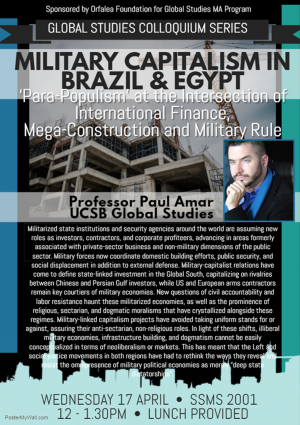Event Date:
Event Location:
- SSMS 2001
Military Capitalism: In Egypt and Brazil, the foundations of a terrifying new ‘para-populism’ are taking shape at the intersection of international finance, mega-construction, and military rule
My recent research on the militarization of governance in Egypt and Brazil has focused upon questions of new political economy, informed by comparative/transregional area studies perspectives, and global studies methods. Militarized state institutions and security agencies around the world are assuming new or newly-expanded roles as investors, contractors, and even corporate profiteers. They are advancing in areas formerly associated with private-sector business and non-military dimensions of the public sector. So what is new about this set of transregional patterns of militarized capitalism? First, military forces now coordinate domestic building efforts, public security, and social displacement in addition to—or instead of—focusing primarily on preparing for external wars and defense. Second, military-capitalist relations now define state-linked investment initiatives in the Global South. They capitalize on rivalries between Chinese companies and Persian Gulf sovereign-fund investors, while U.S., Russian, British, German, and Italian arms contractors remain key courtiers of military economies in both regions. Third, new questions of civil accountability and labor resistance haunt this new militarized economy. As the heads of the economy and governance agencies, should soldiers be a part of an expansion of public-sector workers’ rights, or do they function as the antithesis of those rights? Should the profits created by military-coordinated projects be redistributed as public patrimony or recaptured as private wealth by oligarchs? Fourth, one cannot ignore the prominence of religious, sectarian, and dogmatic moralisms that have crystallized alongside these new military-economic regimes. The mega-age of military capitalism has taken shape in an era of surging mobilizations of Neo-Pentecostals and evangelical Christians in Latin America, at the same time as Salafist and Wahhabi inspired hardliners have come to power in the Middle East. However, projects of military-linked capitalism have tended to avoid taking any uniform stand for or against these ideologies, and armed forces in both regions have gone out of their way to assure their anti-sectarian, non-religious roles. In light of these shifts, illiberal military economies and methods of extraction, infrastructure building, and dogmatism cannot be easily conceptualized in terms of neoliberalism or markets. This has meant that the Left—or social justice movements in general in both regions—have had to rethink the ways they better reveal and resist the everyday omnipresence of military political economies, moving beyond notions of “deep states” or strict definitions of authoritarian “dictatorship.”
Paul Amar, Professor in the Global Studies Department at the University of California Santa Barbara, is a political scientist and anthropologist with affiliate appointments in Feminist Studies, Sociology, Comparative Literature, Middle East Studies, and Latin American & Iberian Studies. Before he began his academic career, he worked as a journalist in Cairo, a police reformer and sexuality rights activist in Rio de Janeiro, and as a conflict-resolution and economic development specialist at the United Nations. His books include Cairo Cosmopolitan (2006); New Racial Missions of Policing (2010); Global South to the Rescue (2011); Dispatches from the Arab Spring (2013); and The Middle East and Brazil (2014). His book "The Security Archipelago" was awarded the Charles Taylor Award for "Best Book of the Year" in 2014 by the Interpretive Methods Section of the American Political Science Association



